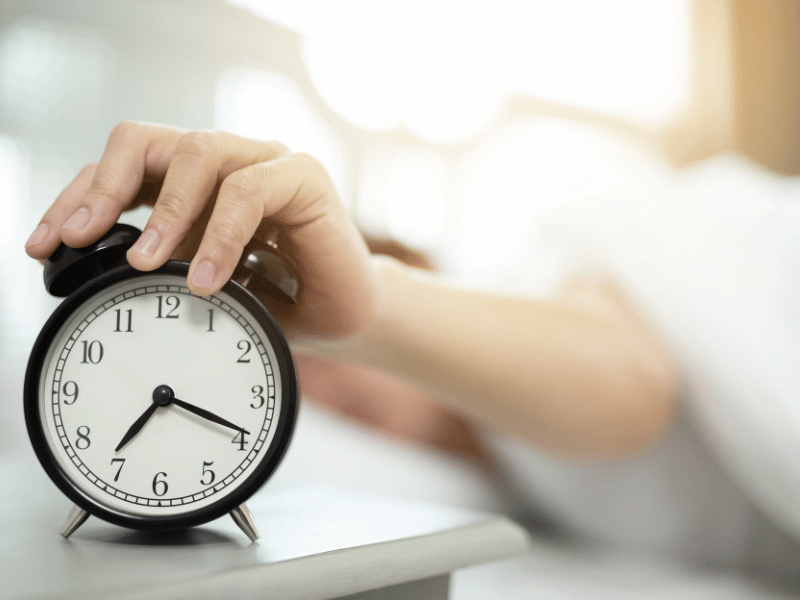


Are you always feeling groggy in the morning and throughout the work day? It’s most likely to do with your sleep habits. Most adults need at least 7 hours of sleep per night to stay alert and awake during the day, but unfortunately, many are still getting less than that. Learn more about some sleep tips on how you can wake yourself up, especially when you are tired in the morning.
On average, a healthy adult should get between 7 to 9 hours of sleep, according to sleep experts. Those who get less than 7 hours of sleep per night are likely to face more health issues like heart disease, type 2 diabetes, obesity, and dementia.
That said, the amount of sleep that we need is also dependent on our individual needs and whether it is good quality sleep. Say, for example, if we are sick or recovering from lost sleep or sleep debt, there is a higher chance that we may need more hours of sleep beyond 7 to 9 hours, and that is perfectly normal. There’s a need to consider the situation, how much sleep our body needs, and the quality of rest we are getting [1], [2].
If you’re always feeling tired, no matter the time of the day, then this is a good time for you to start looking at your sleep habits.
One common reason for always feeling sleepy is an irregular sleep schedule. An irregular sleep schedule is when you may sleep earlier one day and very late the next, or vice versa.
It could also be that you are napping excessively long during the day, hindering your ability to fall asleep at night. These factors lead to sleep disruption and eventual sleep deprivation.
Does it feel like you need much effort to get up every morning? Want to stop dragging your feet every morning? Well, it all starts with your sleep habits, and it may be time to reset them.
Here are 10 ways to wake up with more energy and get rid of the sleep inertia in the morning.
The most important thing that you want to do is to establish a consistent sleep schedule. This means waking up and going to bed at the same time each day, even on weekends. Doing this will help to regulate your body clock, so that you can fall asleep faster and wake up early in the morning feeling ready to take on the day.

Another tip is to start letting more sunlight into your room whenever you get up in the morning. Bright light reduces melatonin production, signalling to your brain that it is time to wake up. As soon as you wake up, you can open the curtains to let the light in or step outside and allow yourself to feel the natural light and fresh air.

After a long night’s rest, you might wake up feeling parched. Drink plenty of cold water in the morning to stay hydrated and keep your blood flowing and energy levels up.

You may also want to consider doing a quick stretch or workout after waking up in the morning to get rid of the groggy feeling. You can try light stretches, yoga, or go on a short walk to raise your heart rate and increase blood flow within the body.
This will also help to combat low energy levels, support your mental health, and increase alertness for the rest of the day ahead.
Never skip out on your breakfast or meals! Fueling your body with essential protein and fiber will help to keep you energized. You also want to stick to eating healthy snacks and avoid sugary foods as much as possible to prevent a sugar crash later in the day.
But, if you often experience low blood sugar levels, then you may want to keep a sugary snack or candy handy to help keep your sugar levels stable and prevent sluggishness.

As tempting as it may be to reach for the snooze button in the morning when you are still exhausted, try to avoid it as much as you can. Snoozing will disrupt your natural wake cycle and only cause you to feel more groggy and sleepy.
If you know that you are likely to snooze your alarm in the morning, try keeping your alarm clock across the room or as far away as possible from you in the room so that you’re forced to get up if you want to snooze it.

You also want to limit your caffeine intake past the early afternoon and before your bedtime so that your sleep does not get disrupted. Caffeine is a stimulant that increases the activity in your brain and nervous system, causing you to feel more awake.
When you consume it at night or close to bedtime, along with exposure to blue light, it may lead to sleep disruptions or an inability to fall asleep, which will cause you to feel more sleepy in the morning. Hence, you want to avoid it or keep your caffeine consumption for the morning or early afternoon.
Peppermint, citrus, and eucalyptus are known to stimulate alertness. You may turn to using essential oils in a diffuser or dabbing a little on your wrists for a quick pick-me-up.
Skip the classical music or calming instrumental and instead, opt for lively music or a suspenseful podcast as part of your morning routine. Doing so will help to keep your mind in a more alert and motivated state, so that you will stay awake and not doze off as soon as you wake up.

Last but not least, you can also try a sleep app like ShutEye® to help wake you up in the morning. ShutEye® offers a smart alarm clock feature that wakes you up gently in your lightest sleep phase. This will make mornings feel more natural and easier to wake up to and less jarring.
Waking up tired doesn’t have to be your everyday reality. By making a few changes to your lifestyle and ensuring that you are practicing good sleep habits, you will be able to regulate your sleep cycle and wake up feeling more energized. From getting natural sunlight to using a smart sleep app, each small habit can make a big difference in how you feel when the alarm rings.
Alternatively, if you need an extra hand to help you get enough sleep, Let ShutEye® do the work for you. With a smart alarm clock feature and personalized sleep tips, discover new ways to reduce fatigue and start your day refreshed. Try it today for FREE!
John Hopkins Medicine (n.d.) Health Risks of Poor Sleep [online]. Available at: https://www.hopkinsmedicine.org/health/wellness-and-prevention/health-risks-of-poor-sleep
National Heart, Lung and Blood Institute (2022) How Much Sleep Is Enough? [online]. Available at: https://www.nhlbi.nih.gov/health/sleep/how-much-sleep